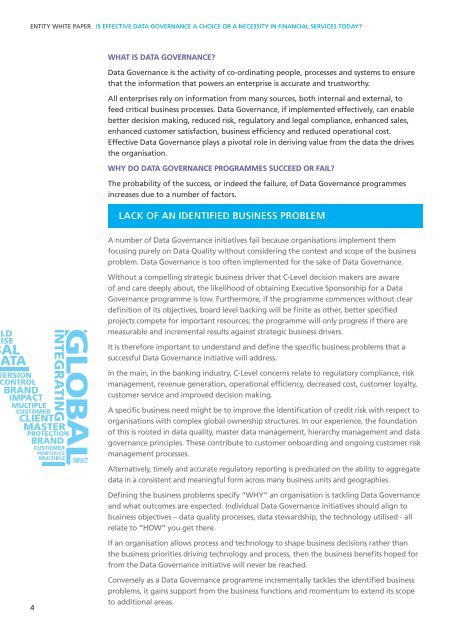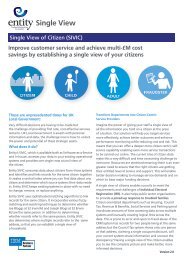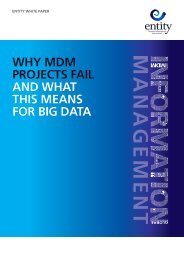MDM_Whitepaper_EDG_Finance
Create successful ePaper yourself
Turn your PDF publications into a flip-book with our unique Google optimized e-Paper software.
ENTITY WHITE PAPER IS EFFECTIVE DATA GOVERNANCE A CHOICE OR A NECESSITY IN FINANCIAL SERVICES TODAY?<br />
WHAT IS DATA GOVERNANCE?<br />
Data Governance is the activity of co-ordinating people, processes and systems to ensure<br />
that the information that powers an enterprise is accurate and trustworthy.<br />
All enterprises rely on information from many sources, both internal and external, to<br />
feed critical business processes. Data Governance, if implemented effectively, can enable<br />
better decision making, reduced risk, regulatory and legal compliance, enhanced sales,<br />
enhanced customer satisfaction, business efficiency and reduced operational cost.<br />
Effective Data Governance plays a pivotal role in deriving value from the data the drives<br />
the organisation.<br />
WHY DO DATA GOVERNANCE PROGRAMMES SUCCEED OR FAIL?<br />
The probability of the success, or indeed the failure, of Data Governance programmes<br />
increases due to a number of factors.<br />
LACK OF AN IDENTIFIED BUSINESS PROBLEM<br />
A number of Data Governance initiatives fail because organisations implement them<br />
focusing purely on Data Quality without considering the context and scope of the business<br />
problem. Data Governance is too often implemented for the sake of Data Governance.<br />
Without a compelling strategic business driver that C-Level decision makers are aware<br />
of and care deeply about, the likelihood of obtaining Executive Sponsorship for a Data<br />
Governance programme is low. Furthermore, if the programme commences without clear<br />
definition of its objectives, board level backing will be finite as other, better specified<br />
projects compete for important resources; the programme will only progress if there are<br />
measurable and incremental results against strategic business drivers.<br />
It is therefore important to understand and define the specific business problems that a<br />
successful Data Governance initiative will address.<br />
In the main, in the banking industry, C-Level concerns relate to regulatory compliance, risk<br />
management, revenue generation, operational efficiency, decreased cost, customer loyalty,<br />
customer service and improved decision making.<br />
A specific business need might be to improve the identification of credit risk with respect to<br />
organisations with complex global ownership structures. In our experience, the foundation<br />
of this is rooted in data quality, master data management, hierarchy management and data<br />
governance principles. These contribute to customer onboarding and ongoing customer risk<br />
management processes.<br />
NS<br />
Alternatively, timely and accurate regulatory reporting is predicated on the ability to aggregate<br />
data in a consistent and meaningful form across many business units and geographies.<br />
Defining the business problems specify “WHY” an organisation is tackling Data Governance<br />
and what outcomes are expected. Individual Data Governance initiatives should align to<br />
business objectives – data quality processes, data stewardship, the technology utilised - all<br />
relate to “HOW” you get there.<br />
If an organisation allows process and technology to shape business decisions rather than<br />
the business priorities driving technology and process, then the business benefits hoped for<br />
from the Data Governance initiative will never be reached.<br />
4<br />
Conversely as a Data Governance programme incrementally tackles the identified business<br />
problems, it gains support from the business functions and momentum to extend its scope<br />
to additional areas.







